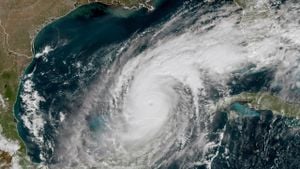U.S. Secretary of State Antony Blinken recently announced significant progress from Israel toward addressing humanitarian needs amid the Gaza crisis. According to him, Israel has successfully met 12 of the 15 specific demands set forth by the United States aimed at alleviating civilian suffering. This statement marks a hopeful turn as Blinken implied this could be the moment to bring the conflict to an end.
The situation on the ground remains dire, particularly for the 2.3 million residents of Gaza. Suffering has reached unprecedented levels since hostilities reignited, with concerns mounting over civilian casualties and infrastructure devastation. Israel's military operations, intended to dismantle Hamas, have also led to mounting fatalities among non-combatants, primarily women and children. Estimates suggest around 70% of the casualties are civilians, raising ethical questions about the conduct of the military actions.
The current stage of the conflict has intensified calls for humanitarian aid, with many international entities urging swift action to provide relief. While Blinken's comments suggest progress, they come amid heightened scrutiny of both U.S. foreign policy and Israel's military strategies. The U.S. hopes these measures will help mend the relationship with Palestinians, which has deteriorated amid rising violence.
On the front lines of aid distribution, the United Nations Relief and Works Agency for Palestine Refugees, commonly referred to as UNRWA, is facing unprecedented challenges. Sam Rose, UNRWA's director of operations, warned of catastrophic potential outcomes if Israel follows through with plans to close the agency, which provides education, health services, and basic necessities. Before any practical measures can be adopted, aid organizations need to navigate the political minefields exacerbated by the military conflict.
UNRWA operates not just within Gaza but also extends its services to Palestinian refugees located across the West Bank, Jordan, and Lebanon. Rose emphasized the importance of sustaining the agency's operations to avoid turning Gaza and surrounding regions back to conditions reminiscent of the dire health crises of the 19th century.
Meanwhile, the Biden administration's recent stance has been interpreted as cooling off its previous demands on Israel. Reports indicate the U.S. government has stepped back from making any immediate punitive actions against Israel for failing to smoothly facilitate humanitarian aid. Instead, U.S. officials have pointed to more cautious language about Israel's actions. While it is deemed inadequate, there is still recognition of Israel's steps, including the opening of new crossings to facilitate aid delivery.
Nonetheless, the dynamic remains complex, with many viewing these measures as insufficient under the immense humanitarian toll seen. Recent data suggests tens of thousands of people are left without access to clean water, food, or adequate medical care, leading to urgent appeals for increased support.
Domestically, intense scrutiny continues on the Biden administration's approach to the Israeli-Palestinian conflict as the 2024 election looms. Some critics argue the government is not doing enough to push back against Israel’s hardline tactics, especially when it pertains to its handling of pro-Palestinian voices and aid efforts. The discourse surrounding Israel is tangled with issues of antisemitism as well, especially after incidents where hate-fueled violence against Jewish communities surged following the conflict's escalation.
Elsewhere, communities globally have rallied to aid Palestinians through various initiatives. Protests advocating for increased humanitarian efforts have swept across cities, with demonstrators calling for higher accountability from their governments. Calls for action have also come from prominent figures, urging legislative changes to direct more aid to those suffering during the crisis.
Looking forward, it remains to be seen how the dynamics of U.S.-Israel relations will evolve amid these pressing humanitarian concerns. Should the U.S. adopt more stringent measures to compel Israel toward social and political reform, it might reshape both public opinion at home and the broader geopolitical atmosphere.
For now, the focus remains firmly on Gaza and the tremendous burden its people carry during these unprecedented times. There are serious fears among experts and humanitarian workers about how continuing volatility will affect stability not just for Palestinians, but for the regional peace and security at large.



